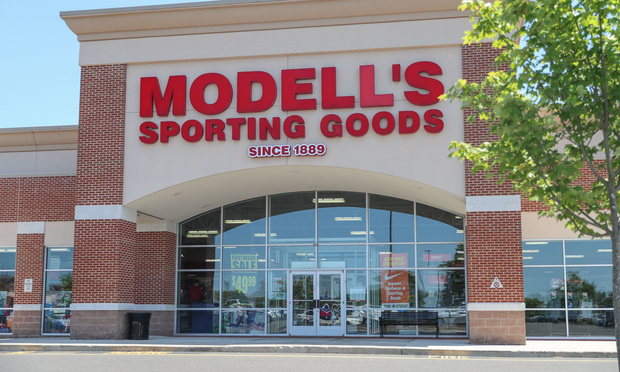Modell's Granted Second Suspension of Bankruptcy Amid COVID-19
The sporting goods retailer was granted its first suspension on March 27, allowing it to defer April 1 rent due to landlords owning the spaces Modell's stores occupy.
April 30, 2020 at 09:55 PM
6 minute read
 Modell's Sporting Goods store in Princeton, New Jersey.
Modell's Sporting Goods store in Princeton, New Jersey.
In a closely watched bankruptcy case involving a retailer caught in the crunch of COVID-19 restrictions, a federal bankruptcy judge granted Modell's a second suspension, to May 31, of its Chapter 11 proceedings as state COVID-19 lockdowns have kept shoppers away.
The sporting goods retailer was granted its first suspension March 27, allowing it to defer April 1 rent due to landlords owning the spaces Modell's stores occupy.
During Thursday's nearly three-and-a-half-hour teleconference hearing, and over the objection of a majority of the debtors' landlords, U.S. Bankruptcy Judge Vincent Papalia of the District of New Jersey again referenced an infrequently used bankruptcy law provision, Section 305 of the U.S. Bankruptcy Code, to suspend bankruptcy proceedings once more.
Papalia followed the same reasoning he gave for the first deferment that was reached through a consensual agreement between Modell's lenders, creditors and landlords—that these are indeed extraordinary times brought on by the coronavirus pandemic.
The March 27 ruling was the first known one of its kind pertaining to bankruptcies.
But Papalia on Thursday said he hopes the parties would reach an agreement, and suspension "would not be commonplace."
Papalia directed the parties to engage in mediation through another judge, with a status conference scheduled for May 20. The judge said he would provide the name of the mediator to the debtors' counsel to share with the other parties.
Michael Sirota of Cole Schotz in Hackensack, counsel for Modell's, said in an email to the Law Journal: "We are pleased with an extension of interim relief."
Sirota, co-chairman of the firm's bankruptcy and corporate restructuring department, said Modell's relied on Section 305 because it allows for the suspension of a bankruptcy case if it is in the interest of the bankruptcy estate and creditors.
The second suspension, unlike the first, was granted over the objections filed by approximately 44 landlords for slightly fewer than half of the debtors' 134 stores across the country.
Landlords argued in the teleconference that they are suffering hardship with the loss of rent and that the debtors are running the case. They also expressed growing anxiety over the risk they are taking due to the potential for administrative insolvency.
Papalia said the debtors do not have the cash to pay the rent now but that when sales come in, there should be a mechanism to protect the landlords.
Joseph Lemkin of Lawrenceville-based Stark & Stark's bankruptcy and creditors' rights group represents a landlord who owns properties with three Modell's stores in New Jersey and New York. He participated in Thursday's teleconference hearing.
"Landlords are concerned that it's only a suspension at this point, and there's been no protection guarantee or agreement to share proceeds," Lemkin said. "There's still a sense of insecurity for the landlords in terms of deferred rent. They realize if there's too much deferred rent there will be insufficient proceeds to pay it from GOB [going out of business] sales to pay banks and landlords."
Sirota said despite discussions with an "unofficial" ad hoc group of landlords, with negotiations through Arthur Steinberg of King & Spalding, the parties were unable to reach consensus before Thursday.
Sirota said that, to Modell's favor in securing a second extension, a variance report of the initial suspension period showed that Modell's business performed better than projected.
The debtors also submitted an updated cash forecast for the new suspension period that projects slightly lower expenses than initially anticipated, using approximately $1.2 million of the lenders' cash collateral through May 30 to pay essential expenses.
Modell's, with 33 stores in New Jersey and several in Pennsylvania and Delaware, was in the midst of closing stores after filing for Chapter 11 bankruptcy on March 11.
Then the pandemic hit, and individual governors issued executive orders to shut all nonessential retail establishments. New Jersey shut them down on March 16, and Pennsylvania on March 15.
Some states recently announced they are reopening parks and golf courses, starting Friday in Pennsylvania and Saturday in New Jersey. But when nonessential businesses can expect to open is still up in the air.
On March 23, Modell's filed an emergency application with the U.S. Bankruptcy Court in New Jersey to suspend the liquidation process, stating: "Notwithstanding the Debtors' best laid plans COVID-19 has prevented the Debtors from conducting the robust liquidation sales that seemed possible just one week ago; it has left the Debtors with no choice but to temporarily 'mothball' their operations to preserve value."
Modell's desire to mothball inventory during the COVID-19 pandemic is shared by other retailers going through bankruptcy, including Pier 1. U.S. Bankruptcy Judge Kevin Huennekens of the Eastern District of Virginia determined earlier this week to further extend Pier 1's "limited operations period" through May 31.
Like the first suspension for Modell's, Lemkin said landlords are primarily concerned that they won't be adequately protected.
"The judge recognizes the enormity and unprecedented nature of the situation," Lemkin said. "He's trying to maintain that there is a way for the prospect of an orderly liquidation down the road.
"The Judge also recognizes that he doesn't want to make this a case where it will be solely carried on the shoulders of the landlords as part of requiring them to mediate the dispute," added Lemkin. "He essentially said, 'OK, put this off since there's no money to pay landlords. But when the stores open and start making money, don't share the proceeds just with the banks, but also make sure the landlords see funds for the deferred rents.'"
During Thursday's teleconference, the official unsecured creditors committee (UCC) said it supports the further suspension but also supports the landlords' efforts to obtain every dollar to which they are entitled.
Papalia cautioned that the "pain should be shared" among the parties and that the landlords will not be entitled to "zero."
Eric Horn, a bankruptcy attorney at A.Y. Strauss in Roseland who closely monitors the retail industry, noted that "by the judge assuring landlords that they would not be the ones left funding the case, it essentially foreshadows a potential surcharge against the lenders' collateral to cover post-petition rent in the event of administrative insolvency and to the extent the issues are not otherwise settled during the mediation."
This content has been archived. It is available through our partners, LexisNexis® and Bloomberg Law.
To view this content, please continue to their sites.
Not a Lexis Subscriber?
Subscribe Now
Not a Bloomberg Law Subscriber?
Subscribe Now
NOT FOR REPRINT
© 2025 ALM Global, LLC, All Rights Reserved. Request academic re-use from www.copyright.com. All other uses, submit a request to [email protected]. For more information visit Asset & Logo Licensing.
You Might Like
View All

NJ Jury Awards $8M to Woman Injured by Employees Chasing Suspected Shoplifter
3 minute read

Amazon's Audible Hit With Privacy Class Action Over Use of Tracking Pixels
Law Firms Mentioned
Trending Stories
- 1Decision of the Day: Court Holds Accident with Post Driver Was 'Bizarre Occurrence,' Dismisses Action Brought Under Labor Law §240
- 2Judge Recommends Disbarment for Attorney Who Plotted to Hack Judge's Email, Phone
- 3Two Wilkinson Stekloff Associates Among Victims of DC Plane Crash
- 4Two More Victims Alleged in New Sean Combs Sex Trafficking Indictment
- 5Jackson Lewis Leaders Discuss Firm's Innovation Efforts, From Prompt-a-Thons to Gen AI Pilots
Who Got The Work
J. Brugh Lower of Gibbons has entered an appearance for industrial equipment supplier Devco Corporation in a pending trademark infringement lawsuit. The suit, accusing the defendant of selling knock-off Graco products, was filed Dec. 18 in New Jersey District Court by Rivkin Radler on behalf of Graco Inc. and Graco Minnesota. The case, assigned to U.S. District Judge Zahid N. Quraishi, is 3:24-cv-11294, Graco Inc. et al v. Devco Corporation.
Who Got The Work
Rebecca Maller-Stein and Kent A. Yalowitz of Arnold & Porter Kaye Scholer have entered their appearances for Hanaco Venture Capital and its executives, Lior Prosor and David Frankel, in a pending securities lawsuit. The action, filed on Dec. 24 in New York Southern District Court by Zell, Aron & Co. on behalf of Goldeneye Advisors, accuses the defendants of negligently and fraudulently managing the plaintiff's $1 million investment. The case, assigned to U.S. District Judge Vernon S. Broderick, is 1:24-cv-09918, Goldeneye Advisors, LLC v. Hanaco Venture Capital, Ltd. et al.
Who Got The Work
Attorneys from A&O Shearman has stepped in as defense counsel for Toronto-Dominion Bank and other defendants in a pending securities class action. The suit, filed Dec. 11 in New York Southern District Court by Bleichmar Fonti & Auld, accuses the defendants of concealing the bank's 'pervasive' deficiencies in regards to its compliance with the Bank Secrecy Act and the quality of its anti-money laundering controls. The case, assigned to U.S. District Judge Arun Subramanian, is 1:24-cv-09445, Gonzalez v. The Toronto-Dominion Bank et al.
Who Got The Work
Crown Castle International, a Pennsylvania company providing shared communications infrastructure, has turned to Luke D. Wolf of Gordon Rees Scully Mansukhani to fend off a pending breach-of-contract lawsuit. The court action, filed Nov. 25 in Michigan Eastern District Court by Hooper Hathaway PC on behalf of The Town Residences LLC, accuses Crown Castle of failing to transfer approximately $30,000 in utility payments from T-Mobile in breach of a roof-top lease and assignment agreement. The case, assigned to U.S. District Judge Susan K. Declercq, is 2:24-cv-13131, The Town Residences LLC v. T-Mobile US, Inc. et al.
Who Got The Work
Wilfred P. Coronato and Daniel M. Schwartz of McCarter & English have stepped in as defense counsel to Electrolux Home Products Inc. in a pending product liability lawsuit. The court action, filed Nov. 26 in New York Eastern District Court by Poulos Lopiccolo PC and Nagel Rice LLP on behalf of David Stern, alleges that the defendant's refrigerators’ drawers and shelving repeatedly break and fall apart within months after purchase. The case, assigned to U.S. District Judge Joan M. Azrack, is 2:24-cv-08204, Stern v. Electrolux Home Products, Inc.
Featured Firms
Law Offices of Gary Martin Hays & Associates, P.C.
(470) 294-1674
Law Offices of Mark E. Salomone
(857) 444-6468
Smith & Hassler
(713) 739-1250






